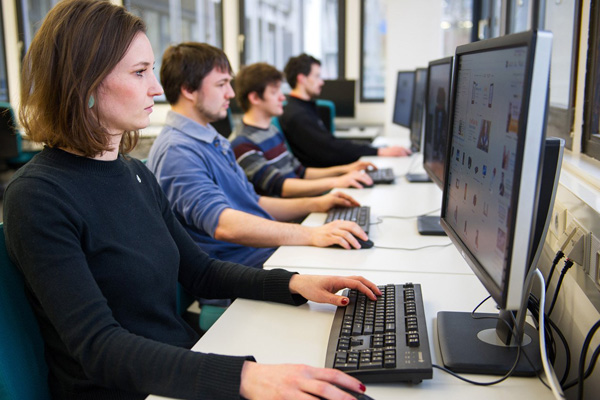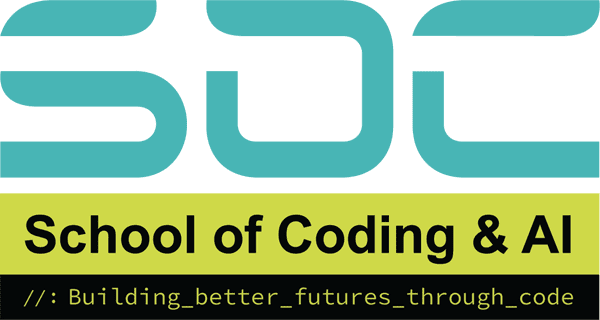BSc (Hons) Computer Science with Foundation Year
Course Overview
The BSc (Hons) Computer Science with Foundation Year is your first step into the world of technology and innovation. Offered by School of Coding & AI in collaboration with the University of Wolverhampton, this program builds foundational skills in computing, mathematics, and digital literacy, preparing you for advanced computer science studies. With an emphasis on practical learning and cutting-edge technology, this course equips you with the tools to excel in the fast-paced tech industry. This course is ideal for:
- Foundations of Computing: Learn key computer science concepts like algorithms, programming & problem-solving to build a strong technical foundation.
- Hands-On Coding Projects: Work on real-world coding projects to apply theoretical knowledge to practical challenges and experience the tech industry firsthand.
- Develop Academic Skills for Success: Build critical thinking, research, and time-management skills that will set you up for success in university-level studies and beyond.
- Supportive Learning Environment: Learn in a collaborative and nurturing environment, with experienced tutors available to help guide your academic journey.
| Qualification Title | BSc (Hons) Computer Science with Foundation Year |
| Level | Undergraduate |
| Awarding body | University of Wolverhampton |
| Mode of Study | Full-Time or Part-Time |
| Duration | 4 years for full-time students and 8 years for Part-timers |
| Entry Requirements |
|
| Intakes | January and September |
| Campus | Birmingham |
Course Structure & Modules
YEAR 1
- Module: 3PY002
- Credits: 20
- Period: 1
- Type: Core
The aim of this module is for students to develop and effectively use the necessary range of appropriate skills in reading, study, written and oral communication and research required for their future career development.
- Module: 3MM003
- Credits: 20
- Period: 1
- Type: Core
A basic level of numeracy and mathematical competence is needed for every course at the University, and this module will equip you with the knowledge and skills needed to succeed. You will have weekly lectures as well as team-based learning sessions, which have been specially designed to help you overcome any difficulties you might encounter.
- Module: 3MM004
- Credits: 20
- Period: 1
- Type: Core
This module is designed to give you some more advanced mathematical skills and tools which are needed in courses with a stronger maths focus such as computer science or engineering. You will have weekly lectures as well as team based learning sessions which have been specially designed to help you to overcome any difficulties that you might encounter.
- Module: 3CS001
- Credits: 20
- Period: 1
- Type: Core
In this module, you will be introduced to the fundamental concepts and principles common to modern computer systems, including the underpinning mathematics where required. This will enable you to develop an understanding of abstraction, data and number representation. You will use a programming language to develop solutions to problems using algorithms and applying computer logic. For the practical work you will use a simple, inexpensive computer that you will study from both software and hardware perspectives. This will culminate in you developing and testing a complete system to meet the requirements specified.
- Module: 3PY002
- Credits: 20
- Period: 1
- Type: Core
The aim of this module is for students to develop and effectively use the necessary range of appropriate skills in reading, study, written and oral communication and research required for their future career development.
- Module: 3CC004
- Credits: 20
- Period: 1
- Type: Core
This module introduces the fundamental principles of problem solving. It focuses on practical problems from within the disciplines of Science and Engineering, and the identification of potential solutions. The implementation of solutions is supported through the use of suitable IT applications. Indicatively, the practical examples used follow a set number of themes reflecting the multi-disciplinary nature of the Faculty of Science and Engineering.
Year 2
- Module: 4MM013
- Credits: 20
- Period: 2
- Type: Core
In this module, you will learn core mathematical concepts that form the foundation of problem-solving in computer science. You will explore topics such as Set theory, Relations and Functions, Sequences and Series, Vectors, Matrices and Linear algebra, Differential and Integral calculus, and Graph Theory. Building on this foundation, you will apply mathematical reasoning to develop algorithms and implement numerical methods for solving real-world problems. Throughout the module, you will also learn and use Python Programming to translate mathematical ideas into practical computational solutions.
- Module: 4CS015
- Credits: 20
- Period: 2
- Type: Core
This module is designed to provide students with an understanding of fundamental computing concepts and allow them to use these effectively and efficiently. The module will allow you to acquire the necessary knowledge and skills for both completing your degree and succeeding at your chosen field of work. It is designed to be both easy to follow for students with little or no knowledge of the computing concepts to be covered but also to provide additional benefits for students who already have previous experience in the field of computing. The topics that are covered include Logic and Boolean algebra, Truth tables, Computer Architecture, Number Systems, Command line management of a computer, Data processing, Digital Communications, Computer Security and Databases.
- Module: 4CS020
- Credits: 20
- Period: 2
- Type: Core
This module will enable you to develop skills in the creation of interactive 3D applications and environments. Interactive 3D is the ability to interact and connect with the 3D digital content and worlds in the same way as the real world. For example, architects can visualise and walkthrough their building designs, doctors can practise surgery, we can see and customise products we are buying, and instructors can simulate a home and educate people about cybersecurity risks within the home. We are now in a world where interactive 3D content is the norm. We all need some understanding of this technology as workers, creators, and customers. We are going to explore the technology that powers interactive 3D content (i.e., games technology) and the skills that are important for the creation of interactive 3D experiences. Through the exploration of interactive 3D applications, you will also develop the academic skills needed to successfully study in higher education. This includes literature searching, academic writing, critical analysis, referencing and working in groups.
- Module: 4CS017
- Credits: 20
- Period: 2
- Type: Core
This module focuses on how modern software applications are built and structured, with an emphasis on understanding how different layers of hardware and software exchange data over the web via HTTP services. You will also be introduced to database concepts and technologies. You will learn to apply them to the development of modern software applications.
- Module: 4CS021
- Credits: 20
- Period: 2
- Type: Core
This module provides you with an introduction to an industry standard object-oriented programming language (e.g., Java, C#, or C++). The module will give you an introduction to fundamental programming in an oriented programming language and an understanding of object-oriented programming, common data structures and algorithms.
- Module: 4CS001
- Credits: 20
- Period: 2
- Type: Core
In this module, you will be introduced to the fundamental principles common to modern programming languages so that you are well prepared to learn to write programs in a variety of languages. Principles include: problem solving, algorithm design and construction (sequence, selection, iteration, object and activity diagrams), variables, data types, assignment operators, logic, the fundamentals of object orientation (objects and classes, attributes and methods, encapsulation), programming pragmatics (style, testing, debugging), and simple data structures (arrays and lists).
Year 3
- Module: 5CS046
- Credits: 20
- Period: 3
- Type: Core
This module builds on your programming and algorithm journey from the first year by expanding your knowledge of algorithm structure, programming techniques and data structures. You will learn about algorithm design, using data structures in algorithms and explore different types of algorithms using mathematical notation. This module also begins your journey from building serial programs using single threads of execution to concurrency (parallel computing). You will learn about multi-threading algorithms, the pitfalls of multi-threading (such as deadlocks and race conditions) and how to modify algorithms to avoid them. Simple methods of measuring performance may be analysed.
- Module: 5CS024
- Credits: 20
- Period: 3
- Type: Core
This module integrates the subject material studied in other level 4 and 5 modules and gives students experience of developing a software artefact in a team. Working effectively as part of a team is a key skill in the modern world of software development and IT. You will learn about team roles, collaboration techniques, software development techniques, project management tools and techniques, documentation, the commercial and economic context of development and information security.
- Module: 5CS045
- Credits: 20
- Period: 3
- Type: Core
A full-stack developer is a person who develops both front-end and back-end software. This module introduces you to a range of tools and techniques for full-stack web development. The lecture material covers the technologies involved in the production and support of secure, dynamic websites using a server-side scripting language and a database. They also code the design and implementation of a front-end interface. During workshop sessions, you have the opportunity to practice lecture-taught material to develop your own website.
- Module: 5CS019
- Credits: 20
- Period: 3
- Type: Core
This module introduces students to the core principles of object-oriented design and programming, using industry methods and techniques to model, analyse, design, and develop software solutions. Students will build upon foundational programming knowledge to explore advanced concepts, such as encapsulation, inheritance, and polymorphism, through the lens of the Java programming language. Key industry-standard methodologies, including version control, testing, and software documentation, will be explored. A special focus will be placed on integrating modelling practices to design system architectures and visualise object-oriented structures effectively. Additionally, students will address security considerations in software design to ensure robust and resilient systems.
- Module: 5CS048
- Credits: 20
- Period: 3
- Type: Optional
This module explores a range of cloud technologies and culminates in a system being developed for and deployed to cloud infrastructure.
- Module: 5CS032
- Credits: 20
- Period: 3
- Type: Optional
This is a technically orientated module where you will learn the principles of a modern networked environment, and how this extends to the internet. It is a practical orientated view of networks with many opportunities to set up and configure typical network equipment such as switches and routers as used in real networks.
- Module: 5CS037
- Credits: 20
- Period: 3
- Type: Optional
This module provides an overview of various tools, techniques and applications of artificial intelligence. Through a series of lectures and workshops students will have the opportunity to examine the technologies and implement a practical software AI solution. The student’s portfolio will also offer the chance to research current innovations in the subject and understand why AI is considered to be a disruptive technology.
- Module: 5CI021
- Credits: 20
- Period: 3
- Type: Optional
This module looks at different data processing and mining techniques and state-of-the-art data processing and mining tools. The topics include: introduction to data mining and knowledge discovery process, data collection and processing with various data types from a variety of sources, and social web mining. You will look at a variety of techniques and trends in data mining.
- Module: 5CS047
- Credits: 20
- Period: 3
- Type: Optional
Learn how to create games and interactive applications/experiences using an industry-standard programming language, game engine and formal development process. You will develop skills in topics, such as (indicative list): games/app programming, input, physics and animation systems in a game engine, artificial intelligence (AI) for games/apps, mathematics for games/apps and interactive game/app design.
Year 4
- Module: 6CS030
- Credits: 20
- Period: 4
- Type: Core
This module builds on High Performance Computing and Database modules to provide understanding and knowledge of the essential concepts, theories and practices of Big Data. This will include Distributed Systems, the latest advances and techniques in processing and managing big data.
- Module: 6CS007
- Credits: 40
- Period: 4
- Type: Core
In this module, you will start by looking at the Professional issues related to working in the Computing and IT industry. You will consider professional conduct and the social, legal and ethical implications related to the profession, in line with BCS guidelines. In the first semester, you will also start to consider the subject of your final year project. Following discussions with staff members, you will produce a project proposal document and start a literature review on your chosen topic. You will be assigned a project supervisor who will meet with you at regular intervals to provide you with feedback on your work as it progresses. In your second semester, you will continue to work individually on the main part of your final year project with regular meetings with your supervisor. This supervisor plus another member of staff, will assess your project.
- Module: 6CS056
- Credits: 20
- Period: 4
- Type: Optional
This module builds on your full-stack development journey from the second year by providing an in depth understanding of full-stack web application development and emphasises the importance of architectural patterns and Service Oriented Architectures in full-stack Web Development. It also takes a look at current and emerging full-stack web development technologies.
- Module: 6CS060
- Credits: 20
- Period: 4
- Type: Optional
This module builds on your games and interactive application development journey from the second year by providing an in depth understanding of more sophisticated game and interactive application development topics and related technologies. You will develop skills in topics, such as (indicative list): artificial intelligence (AI) for games/apps, multiplayer games/apps, mobile games/apps, mathematics for games/apps and games/app programming.
- Module: 6CS012
- Credits: 20
- Period: 4
- Type: Optional
This module focuses on the current and emerging areas of artificial intelligence and machine learning in both domestic and commercial life. Areas covered vary depending on research interests, but may include Robotics, Digital Entertainment and Industries such as Automotive and Supply Chain. Students will be able to focus on a portfolio of work in their chosen course area, supported by lectures and supporting tutorials.
- Module: 6CS030
- Credits: 20
- Period: 4
- Type: Optional
This module builds on High Performance Computing and Database modules to provide understanding and knowledge of the essential concepts, theories and practices of Big Data. This will include Distributed System, latest advances and techniques in processing and managing big data.
- Module: 6CS059
- Credits: 20
- Period: 4
- Type: Optional
Intelligent systems are advanced computer systems that use artificial intelligence (AI) to perceive and respond to the world around them. Intelligent systems aim to automate intelligent behaviours that traditionally only human beings have been able to perform. Intelligent systems can take many forms, such as autonomous vacuum cleaners, robot delivery drones and personalised suggestions on websites. They can fill many roles in society, such as factory automation, medical care, education, recognition, and transportation. This module provides you with an understanding of intelligent system theory and concepts and an awareness of the issues involved in creating intelligent systems. You will also have the opportunity to develop intelligent systems.
- Module: 6CS061
- Credits: 20
- Period: 4
- Type: Optional
The module aims to prepare you for a career in software development by first equipping you with theory and knowledge of Software Engineering and coupling it with practical application of current techniques. The first part of the module aims to mimic a task similar to that faced by many software engineers in their first job. The task involves the maintenance and extension of a legacy system and includes reverse engineering, automated regression testing and the application of refactoring and design patterns. The second part of the module aims to make you aware of emerging techniques and technologies. Two topics that are of current interest will be focussed and may vary over different runs of the module. Example topic areas include Domain Specific Languages, Quantum Computing, and Static Code Analysis.
Course Structure
- Introduction to Digital Skills: Fundamental skills in digital literacy, computer operations, and software usage.
- Academic Writing and Research: Develop competencies in academic writing and research.
- Mathematics for Computing: Essential mathematical concepts for computer science, including statistics and logic.
- Programming and Problem Solving: Core concepts in coding and logical thinking.
- Data Structures and Algorithms: Key principles for efficient data processing.
- Operating Systems: Study the architecture and functionality of operating systems.
- Network Security and Cybersecurity: Fundamental skills in securing data and managing security threats.
- Programming Projects: Practical coding assignments and software development tasks.
- Lab Work: Hands-on assessments in labs, focusing on systems and network security.
- Written Exams: Evaluate knowledge in mathematics, algorithms, and theory.
- Research Papers: Produce research on topics within computer science.
Entry Requirements
To be eligible for the BSc (Hons) Computer Science with Foundation Year at School of Coding & AI, you should meet the following criteria:
- UCAS Points Requirement: Applicants need a minimum of 48 UCAS tariff points, reflecting a broad and inclusive admissions policy.
- Mathematics and English Proficiency: GCSEs in Mathematics and English at grade C/4 or above (or equivalent) are required to ensure readiness for technical studies.
- Alternative Qualifications: Work experience or vocational certifications may also be considered for admission.

Benefits
At School of Coding & AI, we are committed to more than just teaching theory – we focus on providing a comprehensive learning experience that prepares you for the demands of the modern tech industry. The SOC Higher Education Advantage includes:
- Foundation Year Advantages: The additional year allows students to adapt to the demands of higher education while building confidence in technical subjects.
- Hands-On Learning: Engage in labs, coding projects, and technical problem-solving exercises designed to mirror real-world challenges.
- Career-Oriented Curriculum: School of Coding & AI collaboration with Wolverhampton University ensures access to the latest industry trends and technologies.
Further Career
- Software Development: Graduates can design and develop software for a variety of platforms, from mobile apps to enterprise systems.
- Cybersecurity and IT Management: Gain expertise in safeguarding digital assets and managing IT infrastructure for organisations.
- Data Science and Machine Learning: Use your skills to analyse data and implement AI solutions in industries like healthcare, finance, and tech.
Start your journey in computer science with a solid foundation. Choose School of Coding & AI for a pathway to success. We’re committed to supporting your academic growth, and our hands-on, supportive learning environment ensures you’ll thrive, no matter where you’re starting from.

FAQs
The Foundation Year in Computer Science is a one-year preparatory course for students who wish to pursue a BSc in Computer Science but may not have the required qualifications. It’s ideal for recent school leavers and mature students looking to build a strong academic foundation.
Applicants need a minimum of 48 UCAS tariff points, reflecting a broad and inclusive admissions policy. We will consider applicants who have not achieved 48 UCAS points (equivalence) from prior level 3 qualifications if they have a keen interest in this subject area or hold relevant experience. You will be required to attend and pass a compulsory Prepare For Foundation assessment day where you will take part in a variety of activities which will assess your suitability for the course.
After completing your BSc in Computer Science, you can pursue roles in software development, IT consulting, cybersecurity, data analysis, and more. The foundation year is your first step toward a wide range of opportunities in the tech industry.
The course focuses on building essential computing skills, including programming, algorithms, and academic techniques like research and problem-solving. These skills will ensure you’re ready to handle the demands of degree-level studies.

Get in Touch
35 Livery St, Birmingham B3 2PB, United Kingdom
0121 582 4468

